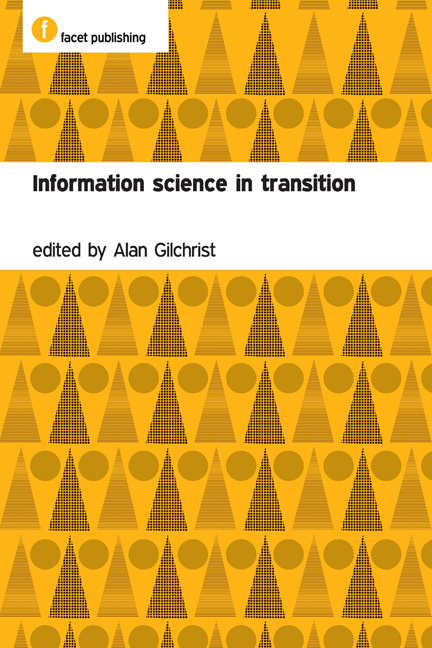Book contents
- Frontmatter
- Contents
- Contributors
- Preface
- Editorial
- Guest Editorial: Meeting the challenge
- 1 Fifty years of UK research in information science
- 2 Smoother pebbles and the shoulders of giants: the developing foundations of information science
- 3 The last 50 years of knowledge organization: a journey through my personal archives
- 4 On the history of evaluation in IR
- 5 The information user: past, present and future
- 6 The sociological turn in information science
- 7 From chemical documentation to chemoinformatics: 50 years of chemical information science
- 8 Health informatics: current issues and challenges
- 9 Social informatics and sociotechnical research – a view from the UK
- 10 The evolution of visual information retrieval
- 11 Information policies: yesterday, today, tomorrow
- 12 The disparity in professional qualifications and progress in information handling: a European perspective
- 13 Electronic scholarly publishing and Open Access
- 14 Social software: fun and games, or business tools?
- 15 Bibliometrics to webometrics
- 16 How I learned to love the Brits
- Index
6 - The sociological turn in information science
Published online by Cambridge University Press: 08 June 2018
- Frontmatter
- Contents
- Contributors
- Preface
- Editorial
- Guest Editorial: Meeting the challenge
- 1 Fifty years of UK research in information science
- 2 Smoother pebbles and the shoulders of giants: the developing foundations of information science
- 3 The last 50 years of knowledge organization: a journey through my personal archives
- 4 On the history of evaluation in IR
- 5 The information user: past, present and future
- 6 The sociological turn in information science
- 7 From chemical documentation to chemoinformatics: 50 years of chemical information science
- 8 Health informatics: current issues and challenges
- 9 Social informatics and sociotechnical research – a view from the UK
- 10 The evolution of visual information retrieval
- 11 Information policies: yesterday, today, tomorrow
- 12 The disparity in professional qualifications and progress in information handling: a European perspective
- 13 Electronic scholarly publishing and Open Access
- 14 Social software: fun and games, or business tools?
- 15 Bibliometrics to webometrics
- 16 How I learned to love the Brits
- Index
Summary
Abstract
This paper explores the history of ‘the social’ in information science. It traces the influence of social scientific thinking on the development of the field's intellectual base. The continuing appropriation of both theoretical and methodological insights from domains such as social studies of science, science and technology studies, and socio-technical systems is discussed.
Introduction: an inter-discipline?
I first published in the Journal of Information Science (JIS) in 1980 [1]. My gossamer paper – that was how I described it to the then editor – most certainly did not set the world alight, nor did it languish in the capacious dustbin of the uncited, though, truth be told, it probably deserved such a fate. ‘Some reflections on citation habits in psychology’ was a (very) brief communication containing three references, one of which was to Jack Meadows’ estimable book, Communication in Science [2]. The two other cited works were articles in American Psychologist and Social Studies of Science. It seems appropriate, this being the Ruby anniversary that never was, to take as my starting point that first foray into print with the official organ of the late lamented Institute of Information Scientists (IIS); doubly so, given that it was, in retrospect at least, an early indicator of my long-standing interest in the intersection of information science and social scientific thinking and practice.
For almost three decades I have been reading and drawing upon the literature of the social and behavioral sciences, specifically sociology of science, science and technology studies (STS) and, more recently, the somewhat amorphous domain of social informatics. By way of illustration, many of the references in both my earliest and most recent books, The Citation Process [3] and The Hand of Science [4], are to monographs and articles sourced from these and cognate fields. It strikes me as inconceivable that the issues which define the sub-fields of information science in which I primarily work – scholarly communication, citation analysis, scientometrics – could have evolved and matured to the extent they have without appropriating insights, both theoretical and methodological, from the social sciences, not least of which is sociology.
- Type
- Chapter
- Information
- Information Science in Transition , pp. 109 - 128Publisher: FacetPrint publication year: 2009
- 2
- Cited by



